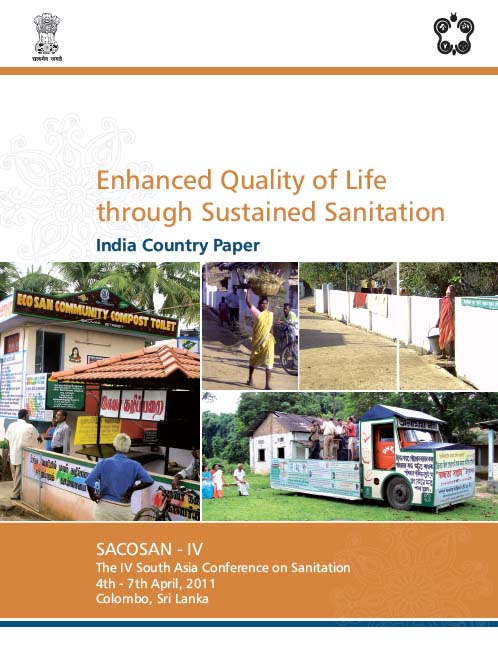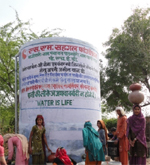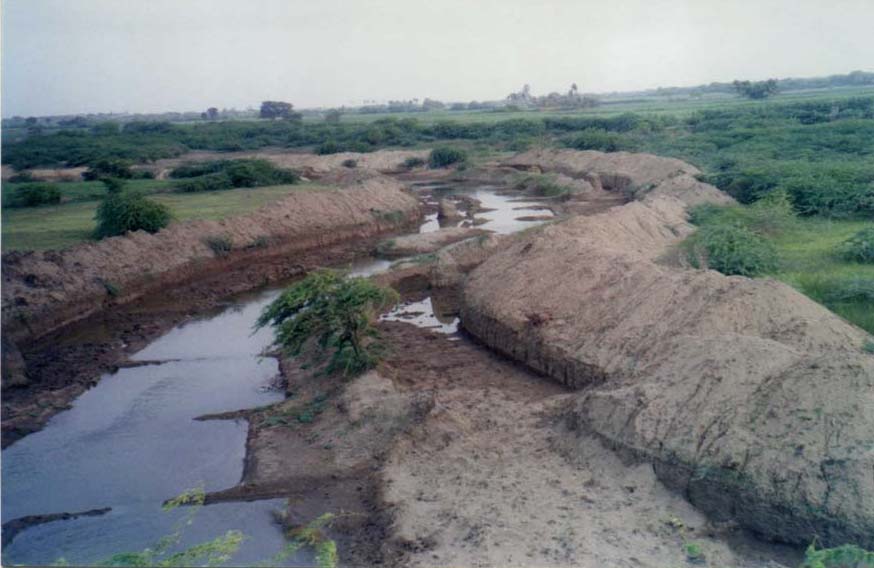Rural Water
Assessment study of impact and sustainability of Nirmal Gram Puraskar – A report by CMS Environment
Posted on 24 Jun, 2011 11:02 PMNGP was initiated in Oct 2003 to encourage Panchayati Raj Institutions (PRIs), block and districts to take up sanitation promotion, a post achievement, award-cum-fiscal incentive scheme. The eligibility criteria for the PRIs to receive NGP include: Gram Panchayats, Blocks and Districts, which achieve 100 per cent sanitation coverage in terms of: (1) 100 per cent sanitation coverage of individual households (2) 100 per cent school and anganwadis sanitation coverage (3) Free from open defecation and (4) Clean environment maintenance (liquid and solid waste management).
Enhanced quality of life through sustained sanitation - India country paper for South Asia Conference on Sanitation
Posted on 24 Jun, 2011 10:09 PM This India Country Paper on Enhanced Quality of Life through Sustained Sanitation was prepared for South Asia Conference on Sanitation (SACOSAN) IV held at Colombo, Sri Lanka in April, 2011.
This India Country Paper on Enhanced Quality of Life through Sustained Sanitation was prepared for South Asia Conference on Sanitation (SACOSAN) IV held at Colombo, Sri Lanka in April, 2011.
In rural sanitation, India’s flagship rural sanitation programme, the Total Sanitation Campaign (TSC), continues to be implemented with renewed vigour, and improvements in multiple facets of the programme. The TSC programme was given a further boost with the introduction of the Nirmal Gram Puraskar (NGP), an innovative incentive scheme for Gram Panchayats, Blocks and Districts. The rural sanitation sector has continued to receive increasing budgetary support.
Alternate management approaches for village water supply systems - Case studies from Maharashtra - A field note by WSP
Posted on 23 Jun, 2011 05:25 PMIt documents the approaches in a context where the state government agencies responsible for construction and management of rural water supply systems have been found to be facing limitations in O&M arrangements.
The traditional approach to provision of rural water supply in India has been supply driven, with emphasis on norms and targets and on construction and creation of assets, but with very little concern for sustainable arrangements for better management and maintenance of the facilities built. The viewpoint that users are ‘beneficiaries’ rather than empowered stakeholders among the service providers has led to alienation of the users.
Down the drain – Exploring traditional water systems - A film by Tarun Jayaram
Posted on 21 Jun, 2011 10:41 AM
down the drain from tarun jayaram on Vimeo.
These are some of the questions which led Tarun Jayaram, the film-maker to explore traditional water systems in the country. From the documentary’s opening moments, the director engages us with a beautifully shot array of footages ranging from pilgrims taking a holy dip of Ganges to beautiful baolis and tankas of Rajasthan to the ancient town of Hampi in Karnataka, while establishing how rivers have been an integral part of Indian culture and how its rich tradition of harvesting rainwater needs to be re-established to deal with the present day water crisis. Over the refreshing images and soothing audio, it advocates the need for community participation in rejuvenating the traditional methods of rainwater harvesting.
Patkhori's water solutions - A case study from the work of SM Sehgal Foundation in Mewat, Haryana
Posted on 14 Jun, 2011 05:27 PM Community water tank
Community water tank
Study of water supply & sanitation practices in India using geographic information systems - Some design & other considerations in a village setting - IJMR research paper
Posted on 06 Jun, 2011 05:01 PMThe study attempted to understand the phenomenon of water contamination in the village by using GIS as a tool to locate and map water supply and sewage distribution systems in the village, in relation to human and animal dwellings, their wastes, sanitary practices and their connections with drinking water quality for a clearer understanding of the connections between these factors and possible
WSP is looking for Senior Institutional Development Specialist (Rural) at New Delhi – Apply by 9th June, 2011
Posted on 31 May, 2011 05:08 PMContent courtesy: DevNetJobsIndia
The Water and Sanitation Program (WSP) administered by the World Bank and funded through international partnerships with a wide range of external support agencies, assists governments to scale up improved water supply and sanitation services and hygiene programs for poor households. A current major thrust of the program’s business plan is helping its clients to prepare for and implement actions towards meeting the Millennium Development Goals (MDGs).
Interlinking of water harvesting structures through link water channels - A viable alternative at micro-level by Ambuja Cement Foundation
Posted on 25 May, 2011 07:39 PM The coastal areas of Gujarat especially the villages lying within 20-25 km from the seashore are suffering from the problem of salinity ingress. Most of the rivulets that drain this region like Goma and Somat are seasonal at best and their water does not last beyond monsoons. The other aquifers like ponds, which get water from these rivers, also dry up as early as October.
The coastal areas of Gujarat especially the villages lying within 20-25 km from the seashore are suffering from the problem of salinity ingress. Most of the rivulets that drain this region like Goma and Somat are seasonal at best and their water does not last beyond monsoons. The other aquifers like ponds, which get water from these rivers, also dry up as early as October.
Inclusion of a component relating to rural drinking water in the special package for drought mitigation strategies in Bundelkhand region of Uttar Pradesh and Madhya Pradesh - PIB release
Posted on 22 May, 2011 05:09 PMThis would be in addition to the other measures approved by the Cabinet on 19th November, 2009 under the special package for implementing drought mitigation strategies in Bundelkhand.
Now it is water all the way in Garhkundar–Dabar watershed of drought-prone semi-arid Bundelkhand – A paper in Current Science
Posted on 19 May, 2011 08:07 AMThe area suffers from water scarcity, natural resource degradation, low crop productivity (1–1.5 t/ha), low rainwater use efficiency (35–45 per cent), high erosion, poor soil fertility, frequent droughts, poor irrigation facilities, heavy biotic pressure on forests, inadequate vegetation cover and frequent crop failure resulting in scarcity of food, fodder and fuel. The region has serious limitations of ground and surface-water availability and heavily depends upon perched water for drinking as well as irrigation.





